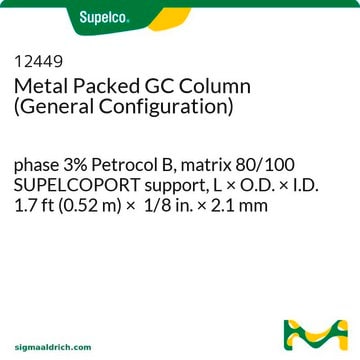214477
Silica gel Inorganic Sorbent
high-purity grade (Davisil Grade 923), 100-200 mesh
About This Item
Recommended Products
product name
Silica gel, high-purity grade (Davisil Grade 923), pore size 30 Å, 100-200 mesh
grade
high-purity grade (Davisil Grade 923)
Quality Level
form
fine crystals
manufacturer/tradename
Davisil®
technique(s)
LPLC: suitable
surface area
430-530 m2/g
matrix
Silica
matrix active group
silica
particle size
100-200 mesh
75-150 μm
pore size
0.40 cm3/g pore volume
30 Å
bp
2230 °C
mp
>1600 °C
separation technique
hydrophilic interaction (HILIC)
SMILES string
O=[Si]=O
InChI
1S/O2Si/c1-3-2
InChI key
VYPSYNLAJGMNEJ-UHFFFAOYSA-N
Looking for similar products? Visit Product Comparison Guide
Related Categories
General description
a. Aquagel - pores are filled with water
b. Xerogel - by the process of evaporation, aqueous phase in the pores are removed
c. Aerogel - solvent removed by supercritical extraction
Application
Footnote
Grade 923 meets ASTM D1319 specifications for hydrocarbon analysis
Legal Information
Storage Class Code
11 - Combustible Solids
WGK
nwg
Flash Point(F)
Not applicable
Flash Point(C)
Not applicable
Choose from one of the most recent versions:
Already Own This Product?
Find documentation for the products that you have recently purchased in the Document Library.
Customers Also Viewed
Related Content
Low pressure liquid chromatography (LPLC) operates at low pressures, using a pump to drive the mobile phase onto the column.
Low pressure liquid chromatography (LPLC) operates at low pressures, using a pump to drive the mobile phase onto the column.
Low pressure liquid chromatography (LPLC) operates at low pressures, using a pump to drive the mobile phase onto the column.
Low pressure liquid chromatography (LPLC) operates at low pressures, using a pump to drive the mobile phase onto the column.
Our team of scientists has experience in all areas of research including Life Science, Material Science, Chemical Synthesis, Chromatography, Analytical and many others.
Contact Technical Service



